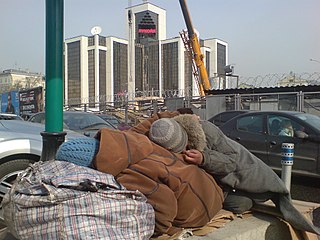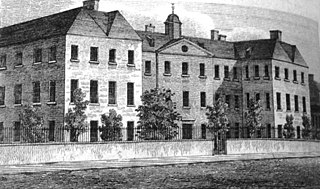
The English Poor Laws were a system of poor relief in England and Wales that developed out of the codification of late-medieval and Tudor-era laws in 1587–1598. The system continued until the modern welfare state emerged in the late 1940s.

In Britain and Ireland, a workhouse was an institution where those unable to support themselves financially were offered accommodation and employment. In Scotland, they were usually known as poorhouses. The earliest known use of the term workhouse is from 1631, in an account by the mayor of Abingdon reporting that "we have erected wthn [sic] our borough a workhouse to set poorer people to work".

Pauperism is poverty or generally the state of being poor, or particularly the condition of being a "pauper", i.e. receiving relief administered under the English Poor Laws. From this, pauperism can also be more generally the state of being supported at public expense, within or outside of almshouses, and still more generally, of dependence for any considerable period on charitable assistance, public or private. In this sense, pauperism is to be distinguished from poverty.

The Poor Law Amendment Act 1834 (PLAA) known widely as the New Poor Law, was an Act of the Parliament of the United Kingdom passed by the Whig government of Earl Grey denying the right of the poor to subsistence. It completely replaced earlier legislation based on the Poor Relief Act 1601 and attempted to fundamentally change the poverty relief system in England and Wales. It resulted from the 1832 Royal Commission into the Operation of the Poor Laws, which included Edwin Chadwick, John Bird Sumner and Nassau William Senior. Chadwick was dissatisfied with the law that resulted from his report. The Act was passed two years after the Representation of the People Act 1832 which extended the franchise to middle-class men. Some historians have argued that this was a major factor in the PLAA being passed.
A poor law union was a geographical territory, and early local government unit, in Great Britain and Ireland.
From the reign of Elizabeth I until the passage of the Poor Law Amendment Act 1834 relief of the poor in England was administered on the basis of a Poor Relief Act 1601. From the start of the nineteenth century the basic concept of providing poor relief was criticised as misguided by leading political economists and in southern agricultural counties the burden of poor-rates was felt to be excessive (especially where poor-rates were used to supplement low wages. Opposition to the Elizabethan Poor Law led to a Royal Commission on poor relief, which recommended that poor relief could not in the short term be abolished; however it should be curtailed, and administered on such terms that none but the desperate would claim it. Relief should only be administered in workhouses, whose inhabitants were to be confined, 'classified' and segregated. The Poor Law Amendment Act 1834 allowed these changes to be implemented by a Poor Law Commission largely unaccountable to Parliament. The act was passed by large majorities in Parliament, but the regime it was intended to bring about was denounced by its critics as un-Christian, un-English, unconstitutional, and impracticable for the great manufacturing districts of Northern England. The Act itself did not introduce the regime, but introduced a framework by which it might easily be brought in.
Boards of guardians were ad hoc authorities that administered Poor Law in the United Kingdom from 1835 to 1930.

The Union Chargeability Act 1865 was an act of the Parliament of the United Kingdom that was passed after the Poor Law Amendment Act 1834. The intention of the act was to broaden the base of funding for relief provided by the Poor Laws.
The Scottish poor laws were the statutes concerning poor relief passed in Scotland between 1579 and 1929. Scotland had a different poor law system to England and the workings of the Scottish laws differed greatly to the Poor Law Amendment Act 1834 which applied in England and Wales.

The Short Titles Act 1896 is an act of the Parliament of the United Kingdom. It replaces the Short Titles Act 1892.
Poor Law policy after the New Poor Law concerns the time period c. 1847–1900 after the implementation of the Poor Law Amendment Act until the beginnings of the decline of the Poor Law system at the start of the 20th century.

The Poor Relief (Ireland) Act 1838 is an Act of the Parliament of the United Kingdom that created the system of poor relief in Ireland. The legislation was largely influenced by the English Poor Law Act of 1834.

A House of Industry was a workhouse in Dublin, Ireland which existed from its establishment by an act of Parliament in 1703, "for the employment and maintaining the poor thereof".
Poor Relief Act is a stock short title used in the United Kingdom for legislation relating to poor relief.

The Statute Law (Repeals) Act 2013 is an act of the Parliament of the United Kingdom which repealed the whole of 817 acts of Parliament, and portions of more than 50 others. It is the largest Statute Law (Repeals) Act which has been recommended by the Law Commission.

The Metropolitan Houseless Poor Act 1864 was a short-term piece of legislation that imposed a legal obligation on Poor Law unions in London to provide temporary accommodation for "destitute wayfarers, wanderers, and foundlings". The Metropolitan Board of Works was given limited authority to reimburse the unions for the cost of building the necessary casual wards, an arrangement that was made permanent the following year by the passage of the Metropolitan Houseless Poor Act 1865.

The Scottish poorhouse, occasionally referred to as a workhouse, provided accommodation for the destitute and poor in Scotland. The term poorhouse was almost invariably used to describe the institutions in that country, as unlike the regime in their workhouse counterparts in neighbouring England and Wales, residents were not usually required to labour in return for their upkeep.
The Waterford Union Workhouse was a workhouse built in 1839–41 on a six-acre site to the south of Waterford in Ireland.








